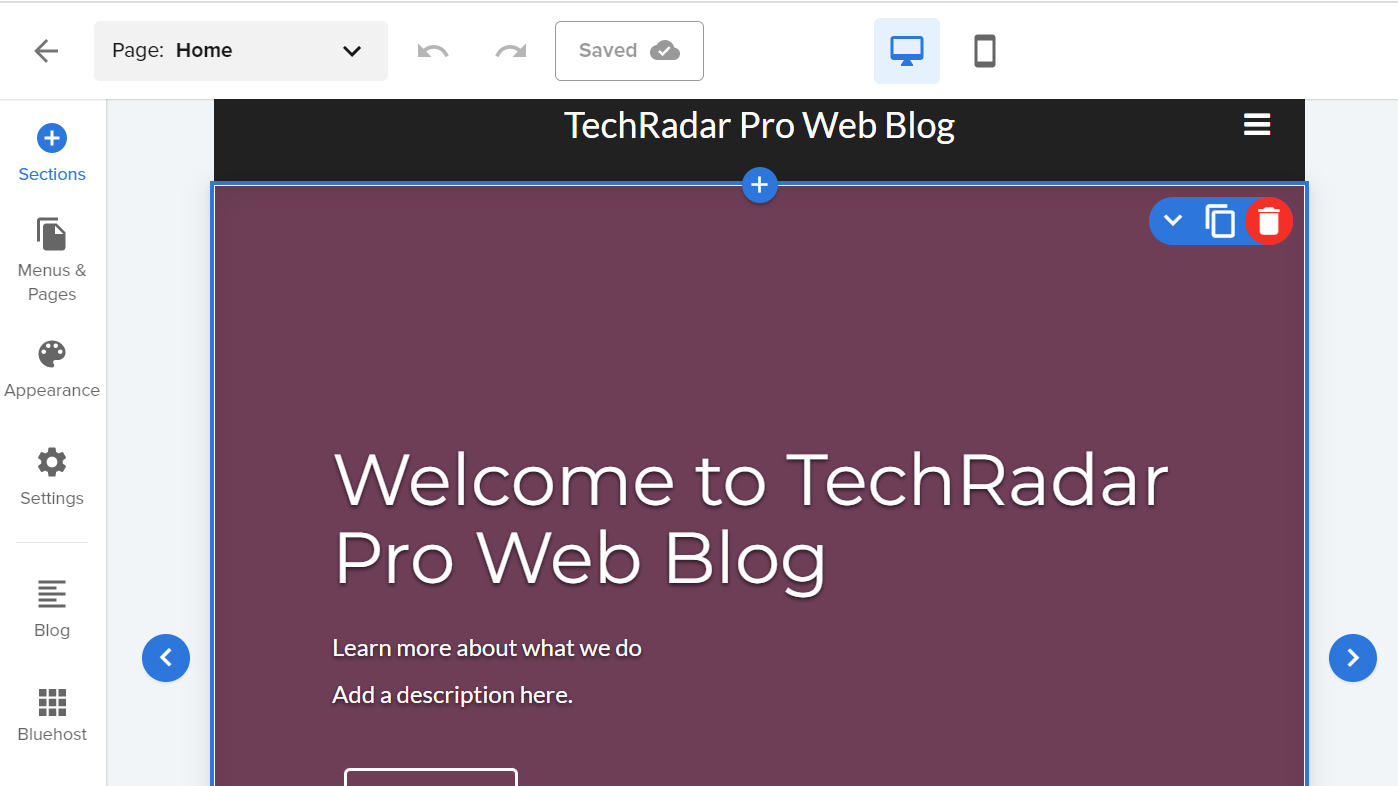Bluehost vs GoDaddy: Two top web hosting providers compared
Two of the most popular web hosts go head-to-head

Sign up for breaking news, reviews, opinion, top tech deals, and more.
You are now subscribed
Your newsletter sign-up was successful
Bluehost and GoDaddy are two of the most popular web hosting providers in today’s market. Both offer a range of features to suit every website builder, from low-end servers for beginners all the way up to high-powered corporate solutions at an affordable price point. With over five million websites hosted by each company alone, it's an indication that they are doing something right - but which one will best serve your needs?
While these web hosts share many similarities, they do have some key differences.
When you're looking for a web host, reliability and performance should be at the top of your list. But what about features like WordPress hosting, security, pricing, ease of use and customer support? This article will take an in-depth look to see which company has better offerings when it comes down to these metrics so that we can help direct you towards deciding on the perfect hosting provider.
Main similarities and differences
Both Bluehost and GoDaddy are popular choices for website hosting. They both offer a variety of services, including domain registration, shared hosting, VPS hosting, and dedicated servers.
The similarity between Bluehost and GoDaddy is that they both offer a money-back guarantee. This means that if you're not satisfied with their service, you can get your money back. Another similarity is that they both have customer support. This is important because if you have any problems with your website, you can contact them and they will help you resolve the issue.
Bluehost offers a free domain name for life with select hosting plans, while GoDaddy charges an annual fee for domain names. Bluehost has a more robust set of features included in their basic shared hosting plans than GoDaddy does. However, Bluehost offers more affordable VPS and dedicated hosting plans than GoDaddy.
Another difference between Bluehost and GoDaddy is the price of their services. GoDaddy is generally more expensive than Bluehost. Also, both companies offer a variety of services at different price points.
Sign up to the TechRadar Pro newsletter to get all the top news, opinion, features and guidance your business needs to succeed!
Pricing
GoDaddy's Standard plan starts at $13.99/month which offers all the features in the basic plan with 50 GB storage and 500 email accounts. The Premium plan starts at $14.99 per month offering everything in the previous two plans, plus some additional features designed specifically for businesses. This includes a free toll-free number, private SSL certificate, and priority customer support.
GoDaddy also offers an ecommerce hosting plan, costing $29.99 per month. This plan includes all of the features of the previous three plans, plus some extras such as unlimited email accounts and a free shopping cart, designed to help businesses sell online. From the above comparison, GoDaddy offers better features and value for money although it may seem a bit pricey even though there are GoDaddy promo codes which help lower the cost. If you are on a tight budget, Bluehost might be a good start.
Pricing is one of the most important factors to consider when choosing a web host. Bluehost's basic plan starts at $2.99/month which will get you a free domain name, SSL, 10GB storage, and free WP integration while GoDaddy's basic plan starts at $6.99/month and offers SEO tools, unlimited bandwidth, SSL, 10GB storage and up to 100 email accounts.
Bluehost's Plus plan goes for $5.45/month inclusive of all the features in the basic plan plus 20GB storage space, Malware scanning, and unlimited websites. However, the Bluehost Choice plan goes for $5.95/month inclusive of all the features in other plans plus 40GB of storage space and the Pro plan starts at $13.45 with 100GB of storage space.
Ease of use
Bluehost is often lauded for its ease of use. Setting up a new account and getting started with Bluehost takes just a few minutes. The interface is straightforward and user-friendly, making it easy to find what you need. Additionally, Bluehost offers a one-click WordPress installation, which makes setting up a new WordPress site quick and easy.
GoDaddy, on the other hand, is not known for its ease of use. The GoDaddy interface can be confusing and difficult to navigate. Additionally, GoDaddy does not offer one-click WordPress installation. This means that building a WordPress website with GoDaddy can be more time-consuming and complicated.
Overall, Bluehost is the better option if you're looking for an easy-to-use web host. GoDaddy is better suited for those who are more experienced with web hosting and are comfortable working with a more complex interface.
Features
Both providers offer a variety of plans to choose from, so you can find one that fits your budget. Bluehost's cheapest plan starts at $2.99 per month, while GoDaddy's cheapest plan is $6.99 per month. Both providers offer discounts if you pay multiple months in advance.
Bluehost provides free SSL certificates, email accounts, domain privacy, daily website backup, and free CDN. GoDaddy, on the other hand, offers a free SSL certificate, a Search Engine Optimization (SEO) toolkit, a branded content creator tool, up to 500 email accounts, On-the-go editing tools, and Custom domain connection.
Both providers offer a money-back guarantee, so you can try out their service without risk. Bluehost's money-back guarantee is 30 days, while GoDaddy's is 48 hours.
Overall, GoDaddy is the better choice if you're looking for more features and value.

Dashboard
GoDaddy has a clear advantage here. The GoDaddy dashboard is much more user-friendly and intuitive than Bluehost’s. Everything is organized in a way that makes sense, and it’s easy to find what you’re looking for. On the other hand, the Bluehost dashboard is a bit of a mess. It’s not nearly as user-friendly, and it can be hard to find what you need.
When it comes to the dashboard, GoDaddy is the clear winner. If you’re looking for an easy-to-use and intuitive platform, GoDaddy is the way to go.

Design
Bluehost's website is clean and straightforward. The homepage features a large search bar where you can enter your domain name. Below the search bar, there are three tabs - "Web Hosting," "VPS Hosting," and "Dedicated Hosting." This makes it easy to find the service that you're looking for.
GoDaddy's website is more cluttered than Bluehost's. The homepage has a lot of text and images, which can be overwhelming. However, there is a search bar at the top of the page, so you can still easily find what you're looking for.
Bluehost's design is much better than GoDaddy's. It's clean and easy to navigate, which is important when you're looking for a web hosting company. GoDaddy's website is too cluttered and it's hard to find what you need.
Templates
As a website owner, it's important to have a plan for your site's design. This includes finding the right hosting platform and choosing between pre-made templates (or opting for a custom design).
Both Bluehost and GoDaddy offer a wide variety of templates to choose from. However, Bluehost offers more template categories than GoDaddy. If you're looking for a specific type of template (e.g., business, ecommerce, blog), you're more likely to find it on Bluehost. GoDaddy also offers fewer customization options than Bluehost. So if you want to make minor changes to your template's design, you'll have an easier time doing so on Bluehost.
If you're looking for a wide selection of templates and customization options, Bluehost is the way to go. But if you're not as concerned about those factors, GoDaddy may be a better option for you.
Interface
GoDaddy's interface is much more user-friendly and easier to navigate than Bluehost's. With GoDaddy, you can easily find what you're looking for and get started with your website. Bluehost, on the other hand, has a more complicated interface that can be confusing for new users.
So, if you're looking for a web hosting company that offers a simple and user-friendly interface, then GoDaddy is the way to go. However, if you don't mind a little bit of a learning curve, then Bluehost might be worth considering.

Website builder capabilities
If you're simply looking for an easy way to create a basic website, then Bluehost's site builder might be a good option for you. On the other hand, if you're looking for more advanced features and greater customization options, then GoDaddy's site builder might be a better fit.
Both Bluehost and GoDaddy offer users a drag-and-drop interface that makes creating a website relatively easy. However, GoDaddy's site builder is powered by Weebly, which offers fewer customization options than Bluehost website builder.
Customer support
There's no doubt that both Bluehost and GoDaddy offer good customer support. However, there are some key differences between the two. For instance, GoDaddy offers 24/7 phone support, whereas Bluehost only offers this during working hours. Additionally, GoDaddy provides live chat support round-the-clock, whereas Bluehost only offers this during working hours as well. So, if you need assistance outside of working hours, Bluehost is the better option.
Another key difference is in the response time. In our tests of the two providers, we found that GoDaddy provides a faster response time than Bluehost. Finally, it's worth noting that Bluehost offers live chat support in English only, whereas GoDaddy offers this in multiple languages. So, if you need support in a language other than English, GoDaddy is the better choice.
Security
Bluehost offers a number of security features to keep your website safe. Their SiteLock service scans your site for malware and vulnerabilities daily, and they offer DDoS protection to keep your site online even in the event of an attack. They also provide a secure socket layer (SSL) certificate with every hosting plan, which encrypts data transmitted to and from your site.
GoDaddy also offers some great security features for its customers. Their Website Security service includes malware scanning and removal, as well as DDoS protection. They also offer an SSL certificate with their Business and Deluxe hosting plans.
However, Bluehost's inclusion of SiteLock malware scanning and removal sets them apart as the more comprehensive option.
Final thoughts
After looking at the different features and aspects of Bluehost and GoDaddy, it's clear that Bluehost is the better option.
However, the ultimate decision depends on the features you want in a web hosting platform. Ensure you do your research before choosing between GoDaddy and Bluehost.
Ruby has been a freelance technology writer for over four years and has a passion for information technology and the Internet in its entirety. She has a wide range of specialities including web hosting, streaming (Firestick, Kodi, and APKs), VPN, information technology, and affiliate marketing. Ruby is a graduate of Bachelor of Science in Commerce from the University of the Philippines, and regularly codes in her free time.